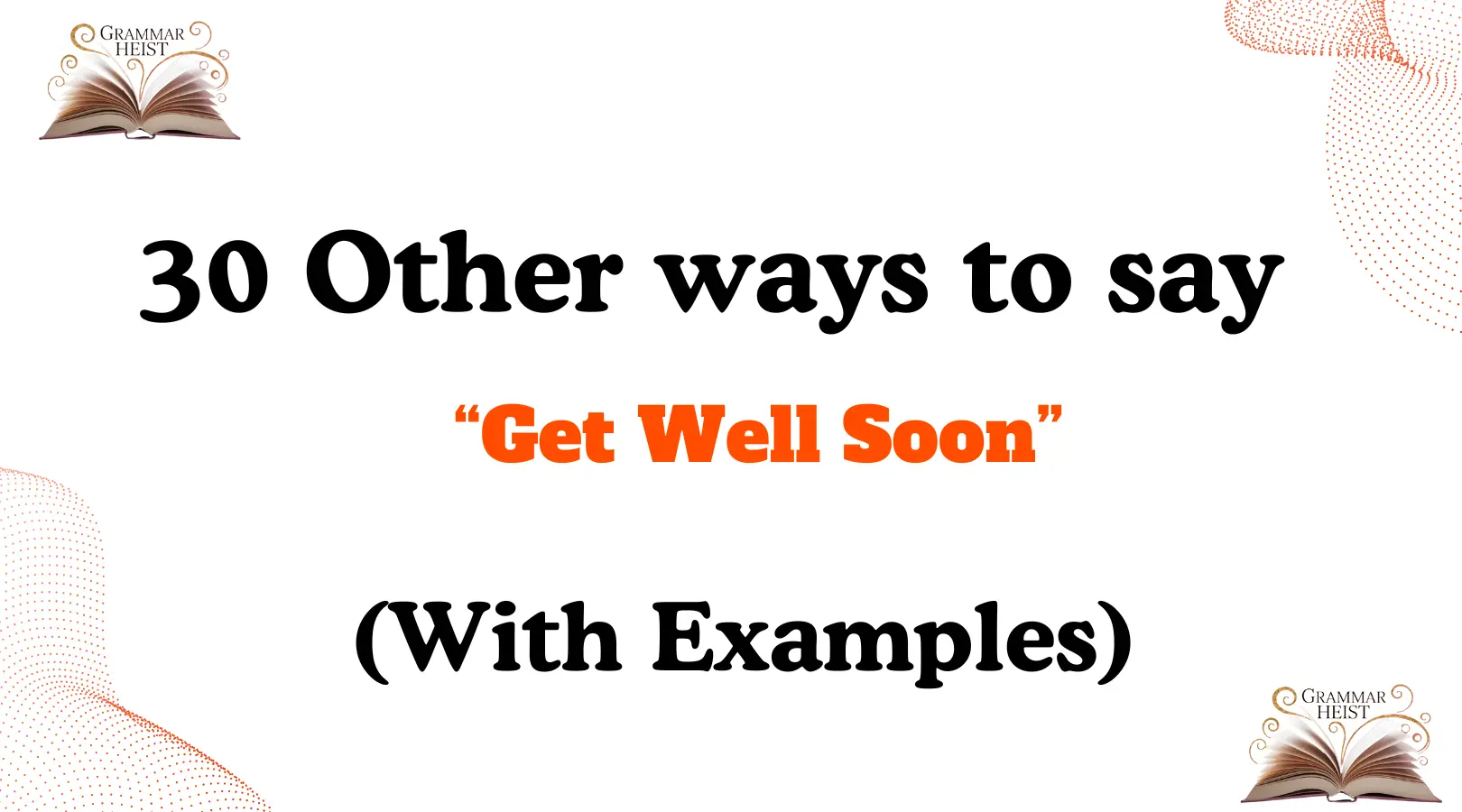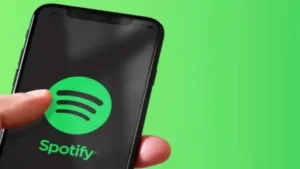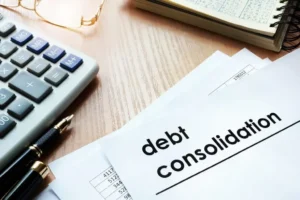When someone you care about isn’t feeling their best, it can be hard to find the right words. While “Get well soon” is a classic and kind phrase, sometimes it feels a bit overused or too simple for the depth of emotion you want to express.
Finding other ways to say “Get well soon” allows you to speak from the heart — showing that you truly care about their well-being and recovery. The right words can bring comfort, hope, and encouragement, making a person feel supported during a tough time.
Whether you’re writing to a friend, family member, colleague, or loved one, these alternatives will help you sound thoughtful, sincere, and personal.
What Does “Get Well Soon” Mean?
The phrase “Get well soon” expresses your hope that someone recovers quickly from illness, surgery, or emotional difficulty. It’s a simple yet powerful way of saying, “I care about you and want you to feel better.”
At its heart, this phrase carries empathy — a message that says, “You’re not alone.” It reminds people that they are thought of, cared for, and supported as they go through recovery.
Is It Professional or Polite to Say “Get Well Soon”?
Yes, absolutely. “Get well soon” is polite, warm, and suitable for almost any situation. In professional settings, it’s a respectful and empathetic way to acknowledge a colleague’s absence or illness.
However, in business or formal contexts, you might want to use slightly more neutral variations such as:
- “Wishing you a smooth and steady recovery.”
- “Hope you’re taking time to rest and heal.”
- “Sending my best wishes for your good health.”
These options sound professional yet caring, maintaining warmth without sounding overly personal.
Pros and Cons of Saying “Get Well Soon”
✅ Pros:
- Universally understood and kind.
- Appropriate for all relationships and contexts.
- Quick and easy to write or say.
⚠️ Cons:
- Can sound generic or impersonal if repeated often.
- May not fit more serious health situations.
- Lacks individuality or emotional depth.
That’s why having other heartfelt alternatives helps you communicate more sincerely and meaningfully.
Synonyms For “Get Well Soon”
- Wishing You a Speedy Recovery
- Hope You Feel Better Soon
- Take All the Time You Need to Heal
- Sending Healing Thoughts Your Way
- Hope Each Day Brings You Closer to Recovery
- Thinking of You and Wishing You Strength
- Get Back to Feeling Like Yourself Again Soon
- Take It Easy and Rest Well
- Hoping You’re Back on Your Feet Soon
- Take Care of Yourself
- Praying for Your Quick Recovery
- Sending You Positive Vibes and Good Energy
- Rest, Recover, and Come Back Stronger
- Hope You’re Feeling Brighter Each Day
- Can’t Wait to See You Feeling Better
- Sending You Comfort and Strength
- Hoping You’re on the Mend
- Wishing You Peaceful Days Ahead
- Take It One Day at a Time
- You’re in My Thoughts and Prayers
- Hope You’re Finding Time to Rest
- May You Feel Better With Each New Day
- Wishing You Gentle Healing
- Take This Time to Focus on You
- Rest Up and Come Back Refreshed
- Hoping You Find Strength in Every Moment
- May You Be Surrounded by Love and Care
- Wishing You Brighter Days Ahead
- Can’t Wait to See You Back to Your Old Self
- Healing Thoughts and Warm Hugs Your Way
Each of these alternatives includes a scenario, examples, tone, and explanation — helping you choose the best message for any situation.
1. Wishing You a Speedy Recovery
Scenario: Perfect for professional messages, emails, or get-well cards.
Examples:
- “Wishing you a speedy recovery and good health.”
- “Hope your recovery is quick and smooth.”
- “Take care and come back stronger soon.”
Tone: Professional, caring, and optimistic.
Explanation: A polished, reliable phrase that works across workplaces, friendships, and formal situations.
2. Hope You Feel Better Soon
Scenario: Friendly and simple — great for casual texts.
Examples:
- “Hope you feel better soon!”
- “Thinking of you and hoping you’re on the mend.”
- “Hang in there — you’ll be feeling like yourself again soon.”
Tone: Warm and personal.
Explanation: Perfect for anyone you want to gently uplift — short, easy, and heartfelt.
3. Take All the Time You Need to Heal
Scenario: Best for people recovering from burnout, surgery, or long-term illness.
Examples:
- “Take all the time you need to heal — no rush.”
- “Your health comes first. Rest and recover fully.”
- “Be patient with yourself — healing takes time.”
Tone: Compassionate and understanding.
Explanation: Encourages self-care and shows you respect their recovery pace.
4. Sending Healing Thoughts Your Way
Scenario: Great for cards, letters, or thoughtful messages.
Examples:
- “Sending healing thoughts your way.”
- “May love and good health surround you soon.”
- “Thinking of you and wishing you gentle healing.”
Tone: Emotional and comforting.
Explanation: Ideal for offering warmth and emotional support without sounding too formal.
5. Hope Each Day Brings You Closer to Recovery
Scenario: Ideal for long-term illness or post-surgery healing.
Examples:
- “Hope each day brings you closer to full recovery.”
- “May every sunrise bring renewed strength.”
- “Step by step, you’ll feel stronger — keep going.”
Tone: Encouraging and steady.
Explanation: Conveys optimism while recognizing that recovery is a gradual journey.
6. Thinking of You and Wishing You Strength
Scenario: Perfect for a serious illness or emotional hardship.
Examples:
- “Thinking of you and wishing you strength.”
- “You’re in my thoughts during this time of healing.”
- “May you find strength and comfort each day.”
Tone: Gentle and empathetic.
Explanation: A respectful phrase for sensitive situations when you want to show genuine care.
7. Get Back to Feeling Like Yourself Again Soon
Scenario: Great for coworkers or friends recovering from minor illness.
Examples:
- “Hope you’re back to feeling like yourself soon.”
- “Can’t wait to see your energy return!”
- “We miss your smile — get better soon!”
Tone: Light, friendly, and encouraging.
Explanation: A positive way to say “we miss you” without sounding overly sentimental.
8. Take It Easy and Rest Well
Scenario: Great for exhaustion, stress, or overwork.
Examples:
- “Take it easy and rest well.”
- “You’ve earned a good rest — take care of yourself.”
- “Rest is the best medicine — take it slow.”
Tone: Calm and nurturing.
Explanation: Focuses on the importance of rest and self-compassion.
9. Hoping You’re Back on Your Feet Soon
Scenario: Commonly used for mild sickness or short-term illness.
Examples:
- “Hoping you’re back on your feet soon!”
- “Get some rest — you’ll be back stronger in no time.”
- “We’re all rooting for your recovery.”
Tone: Friendly and encouraging.
Explanation: Suggests hope and anticipation for their return to normal life.
10. Take Care of Yourself
Scenario: Works in personal, professional, and casual settings.
Examples:
- “Take care of yourself — your well-being matters.”
- “Don’t push yourself too hard; take care.”
- “Rest and recover fully — you deserve it.”
Tone: Gentle and kind.
Explanation: Simple yet caring — ideal when you want to keep things short but thoughtful.
11. Praying for Your Quick Recovery
Scenario: Ideal for someone who values faith or spirituality.
Examples:
- “Praying for your quick and full recovery.”
- “Keeping you in my prayers and thoughts.”
- “May God bless you with healing and comfort.”
Tone: Spiritual and sincere.
Explanation: Offers emotional and spiritual encouragement that feels deeply personal.
12. Sending You Positive Vibes and Good Energy
Scenario: Modern, cheerful message for close friends or younger audiences.
Examples:
- “Sending you positive vibes and good energy.”
- “You’ve got this — better days are ahead.”
- “Healing thoughts and happy energy your way.”
Tone: Fun and uplifting.
Explanation: Adds a fresh, youthful tone while keeping your message positive and bright.
13. Rest, Recover, and Come Back Stronger
Scenario: Perfect for motivated individuals, athletes, or coworkers.
Examples:
- “Rest, recover, and come back stronger than ever.”
- “Take this time to recharge — your best days are ahead.”
- “You’ve got this — rest now and rise later.”
Tone: Inspirational and confident.
Explanation: Emphasizes resilience and positivity — great for motivating someone.
14. Hope You’re Feeling Brighter Each Day
Scenario: For emotional healing or long recoveries.
Examples:
- “Hope you’re feeling brighter with each passing day.”
- “Wishing you light and comfort as you recover.”
- “May tomorrow bring you a little more strength.”
Tone: Gentle and poetic.
Explanation: Encourages slow healing and emotional calm.
15. Can’t Wait to See You Feeling Better
Scenario: Friendly tone for someone you miss seeing regularly.
Examples:
- “Can’t wait to see you feeling better!”
- “We all miss your laughter — get well soon.”
- “Your presence always brightens the day — come back soon.”
Tone: Warm, caring, and sincere.
Explanation: Expresses affection and anticipation for their return.
16. Sending You Comfort and Strength
Scenario: Perfect for someone going through surgery, chronic illness, or emotional healing.
Examples:
- “Sending you comfort and strength during this time.”
- “May you find comfort in rest and strength in hope.”
- “You’re not alone — I’m sending you courage and care.”
Tone: Gentle, reassuring, and emotional.
Explanation: This phrase combines compassion with encouragement, showing that you care not only about their physical recovery but also their emotional well-being.
17. Hoping You’re on the Mend
Scenario: Great for mild illness or short-term recovery.
Examples:
- “Hoping you’re on the mend!”
- “Glad to hear you’re getting better — keep resting.”
- “Hope you’re on the mend and feeling stronger every day.”
Tone: Friendly and familiar.
Explanation: “On the mend” is a cozy, conversational phrase — ideal for messages to friends or family members.
18. Wishing You Peaceful Days Ahead
Scenario: Best for emotional exhaustion or mental health struggles.
Examples:
- “Wishing you peaceful days ahead.”
- “May each day bring you calm and clarity.”
- “Sending love and peace your way as you rest and recover.”
Tone: Soft and comforting.
Explanation: Focuses on emotional recovery — perfect for when someone needs rest and peace more than physical healing.
19. Take It One Day at a Time
Scenario: Great for long-term illness, recovery, or emotional hardship.
Examples:
- “Take it one day at a time — you’re doing great.”
- “Healing isn’t rushed — one step, one day.”
- “Be kind to yourself; take it one day at a time.”
Tone: Patient and encouraging.
Explanation: Helps remind someone that healing is a journey, not a race — perfect for when they’re feeling overwhelmed.
20. You’re in My Thoughts and Prayers
Scenario: Ideal for religious or deeply empathetic messages.
Examples:
- “You’re in my thoughts and prayers.”
- “Praying that you find comfort and healing.”
- “You’re not forgotten — keeping you close in my prayers.”
Tone: Spiritual and sincere.
Explanation: Expresses faith-based care and emotional presence — especially meaningful in close relationships.
21. Hope You’re Finding Time to Rest
Scenario: Great for hardworking friends or coworkers who rarely slow down.
Examples:
- “Hope you’re finding time to rest and recharge.”
- “Make sure you’re taking time for yourself.”
- “Rest isn’t wasted time — hope you’re getting plenty.”
Tone: Caring and understanding.
Explanation: Encourages balance and reminds them that recovery comes through rest.
22. May You Feel Better With Each New Day
Scenario: For long recoveries or hospital stays.
Examples:
- “May you feel better with each new day.”
- “Each sunrise brings new strength — wishing you gentle progress.”
- “Hope every morning finds you feeling a little better.”
Tone: Optimistic and nurturing.
Explanation: Combines calm reassurance with hope for steady improvement.
23. Wishing You Gentle Healing
Scenario: For sensitive circumstances or emotional recovery.
Examples:
- “Wishing you gentle healing and peaceful rest.”
- “May your recovery be kind and calm.”
- “Sending soft thoughts and healing wishes your way.”
Tone: Poetic, tender, and empathetic.
Explanation: This phrase feels soothing and thoughtful — perfect for cards or comforting notes.
24. Take This Time to Focus on You
Scenario: Ideal for burnout, stress, or overwork.
Examples:
- “Take this time to focus on you.”
- “You’ve taken care of everyone else — now it’s your turn.”
- “Give yourself permission to slow down and heal.”
Tone: Supportive and self-care focused.
Explanation: Encourages self-love and rest — ideal for friends or colleagues recovering from exhaustion.
25. Rest Up and Come Back Refreshed
Scenario: Lighthearted, suitable for coworkers or peers.
Examples:
- “Rest up and come back refreshed!”
- “Hope you’re using this time to recharge.”
- “Can’t wait to see you back, feeling renewed.”
Tone: Cheerful and positive.
Explanation: Keeps the message friendly and optimistic, great for workplace notes.
26. Hoping You Find Strength in Every Moment
Scenario: For long-term illness or emotionally tough periods.
Examples:
- “Hoping you find strength in every moment.”
- “You’re stronger than you know — keep going.”
- “Sending resilience and hope your way.”
Tone: Motivational and heartfelt.
Explanation: Encourages emotional courage and inner strength, offering steady support.
27. May You Be Surrounded by Love and Care
Scenario: Ideal for serious illness or recovery after surgery.
Examples:
- “May you be surrounded by love and care.”
- “Wishing you comfort in the kindness of others.”
- “Hope you feel the love that’s all around you.”
Tone: Loving and emotional.
Explanation: This phrase reassures the person that they’re not alone — it’s great for family and close friends.
28. Wishing You Brighter Days Ahead
Scenario: Perfect for those going through emotional recovery or tough times.
Examples:
- “Wishing you brighter days ahead.”
- “The storm will pass — brighter days are coming.”
- “May your days soon be filled with sunshine and peace.”
Tone: Hopeful and kind.
Explanation: A soft, positive reminder that better days are coming — ideal for mental health support.
29. Can’t Wait to See You Back to Your Old Self
Scenario: Great for close friends, colleagues, or family members.
Examples:
- “Can’t wait to see you back to your old self!”
- “We miss your energy and laughter.”
- “The place isn’t the same without you — get better soon.”
Tone: Friendly and familiar.
Explanation: Shows affection and excitement to see them healthy again, perfect for boosting morale.
30. Healing Thoughts and Warm Hugs Your Way
Scenario: Ideal for heartfelt, comforting messages.
Examples:
- “Healing thoughts and warm hugs your way.”
- “If hugs could heal, you’d already be better!”
- “Sending all my love and healing energy your way.”
Tone: Emotional, affectionate, and genuine.
Explanation: Combines warmth and positivity — a perfect closing message for anyone close to your heart.
Key Takeaway
When someone you care about is unwell, your words have real power. They can bring hope, comfort, and reassurance — reminding the person that they’re not alone.
Instead of just saying “Get well soon,” try expressing yourself with phrases that sound more personal, genuine, and full of heart. Whether you’re offering peace, positivity, or strength, what matters most is that your words come from sincere care.
Even a short, loving message can make a difficult day feel a little lighter. 🌿💌
Conclusion
The next time someone you know is recovering — whether from illness, surgery, or emotional strain — remember that your words can truly lift their spirits.
A simple note that says “Wishing you peaceful healing” or “Sending love and strength” can mean the world to someone who’s struggling. You don’t need the perfect words — you just need kindness, empathy, and warmth.
Because healing is more than physical — it’s also about feeling cared for, understood, and supported. Your heartfelt message might be the gentle encouragement they need to smile again. 🌸
FAQs About Other Ways to Say “Get Well Soon”
1. Is It Okay to Say “Get Well Soon” in Professional Settings?
Yes, absolutely. “Get well soon” is polite and caring, and it’s widely accepted in professional environments. However, if you want to sound a bit more formal or polished, you can say something like “Wishing you a speedy recovery” or “Hope you’re feeling better soon.” These phrases express empathy without being too casual.
If it’s a coworker or manager, keeping your tone respectful and professional while still warm is key.
2. What Can I Say Instead of “Get Well Soon” in a Text Message?
For text messages, it’s nice to sound personal and supportive without being too long. Try these:
- “Hope you’re taking good care of yourself.”
- “Thinking of you and wishing you a smooth recovery.”
- “Sending healing thoughts and hugs.”
Short, sincere messages are perfect for texts — especially when you just want to brighten someone’s day.
3. How Do I Say “Get Well Soon” Without Sounding Repetitive?
If you find yourself saying “get well soon” often, try rephrasing it with a personal touch. For example:
- “I hope each day brings you a little more strength.”
- “Take this time to rest and recharge.”
- “Can’t wait to see you feeling better again.”
Adding specific wishes or encouragement keeps your message genuine and avoids sounding routine.
4. What’s the Best Message for a “Get Well” Card?
When writing a card, it’s nice to include both encouragement and warmth. Try combining a kind wish with a comforting sentiment:
“Wishing you gentle healing and peaceful days. Take all the time you need — we’re all thinking of you.”
You can also personalize it with something about their personality or situation, like:
“Work isn’t the same without your laughter — can’t wait to see you back!”
Cards feel more meaningful when they sound authentic and from the heart.
5. How Can I Encourage Someone Who’s Seriously Ill?
For someone facing a serious illness, it’s best to focus on emotional strength, love, and presence rather than just “getting well.” You can say things like:
- “You’re in my thoughts every day.”
- “Sending you comfort, strength, and courage.”
- “You’re not alone in this — I’m here for you.”
These phrases show compassion and emotional support without putting pressure on recovery.
6. Can I Say “Get Well Soon” to Someone Who’s Grieving or Emotionally Struggling?
Not exactly — “get well soon” is usually used for physical illness. If someone is grieving or emotionally struggling, it’s more thoughtful to say:
- “Wishing you peace and strength during this time.”
- “Sending love and comfort your way.”
- “Take all the time you need to heal.”
These messages show empathy and understanding without implying a quick fix.
7. What’s a Romantic Way to Say “Get Well Soon”?
If you’re speaking to a partner or loved one, make it affectionate and tender. Try:
- “Rest up, my love — I’m sending you all my healing hugs.”
- “Wish I could be there to take care of you.”
- “Get better soon, sweetheart — I miss you already.”
Adding a bit of love and warmth makes it feel more intimate and personal. 💞
8. What Should I Avoid When Someone Is Sick?
Avoid phrases that sound dismissive or overly cheerful, like:
- “You’ll be fine soon!” (can sound rushed)
- “It’s not that bad.” (minimizes their feelings)
- “At least you get some time off.” (can seem insensitive)
Instead, focus on listening, empathy, and support. A kind tone and sincere words mean much more than forced positivity.
9. How Do I End a Get Well Message Gracefully?
End with warmth and encouragement. Examples:
- “Take care and know you’re in my thoughts.”
- “Wishing you brighter days ahead.”
- “Sending all my love and healing energy.”
Closing your message with kindness helps the person feel cared for and uplifted.
10. What’s the Most Heartfelt Alternative to ‘Get Well Soon’?
That depends on your relationship, but one of the most heartfelt alternatives is:
“Wishing you gentle healing and peaceful days ahead.”
It’s soothing, compassionate, and works in almost any situation — showing not just that you care about their recovery, but also their comfort and peace of mind. 🌸

Emma Brooke is a passionate advocate for effective communication and language mastery. As a dedicated professional in the field of grammar and writing, Emma brings a wealth of knowledge and expertise to those seeking to improve their linguistic skills. With a focus on clarity, precision, and style, Emma Brooke is committed to helping individuals refine their language use to communicate confidently and effectively.












